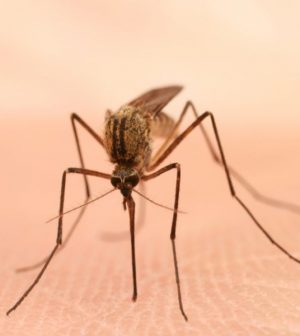- Could Your Grocery Store Meat Be Causing Recurring UTIs?
- Are You Making This Expensive Thermostat Error This Winter?
- Recognizing the Signs of Hypothyroidism
- 10 Strategies to Overcome Insomnia
- Could Artificial Sweeteners Be Aging the Brain Faster?
- Techniques for Soothing Your Nervous System
- Does the Water in Your House Smell Funny? Here’s Why
- Can a Daily Dose of Apple Cider Vinegar Actually Aid Weight Loss?
- 6 Health Beverages That Can Actually Spike Your Blood Sugar
- Treatment Options for Social Anxiety Disorder
Thirsty Mosquitoes May Bite More in Droughts

Your blood mght be a thirst quencher for mosquitoes during a drought.
A new study found that while female mosquitoes need the protein in blood to lay eggs, they also bite you to stay hydrated.
According to the research team from the University of Cincinnati, learning more about how often these insects need to drink blood in dry conditions could lead to new ways to fight mosquito-borne diseases.
These diseases include malaria, West Nile virus, yellow fever, dengue fever, Zika and Eastern equine encephalitis.
“It makes sense,” said study co-author Elise Didion, a biology student.
“We find the highest transmission rates of West Nile virus during droughts because mosquitoes may use blood meals to replace the water they lose,” she said in a university news release.
Biology professor Joshua Benoit added that the findings will “make for better modeling for when disease outbreaks occur. When it’s dry, it might be easier for a mosquito to locate a host than limited supplies of water or nectar.”
Benoit said mosquitoes don’t often seek a blood meal when they have ample water and hydration.
“Normally only 5 or 10 percent of female mosquitoes will feed at any time, depending on the species,” he said. “Dehydration has a big impact on whether they feed normally or not.”
In the lab, his team found dehydration led up to 30 percent of female mosquitoes to seek a blood meal.
It takes only a few hours for mosquitoes to become dehydrated to the point where they might seek blood, Benoit noted.
Study co-author Christopher Holmes added that by knowing how mosquitoes react to drought, scientists may better predict when you’ll see a disease outbreak.
“It’s a step in the right direction toward understanding how the environment affects mosquitoes, which we really can’t answer right now,” Holmes said.
Rising temperatures caused by climate change could cause more frequent and longer periods of drought in areas where mosquitoes are a threat to human health, he suggested.
“You could see effects on mosquitoes that probably will be exacerbated with the increasing frequency of drought, increasing duration and increasing severity,” Holmes said.
The study was published this month in the journal Scientific Reports.
More information
The U.S. Environmental Protection Agency has more on mosquitoes.
Source: HealthDay
Copyright © 2026 HealthDay. All rights reserved.










